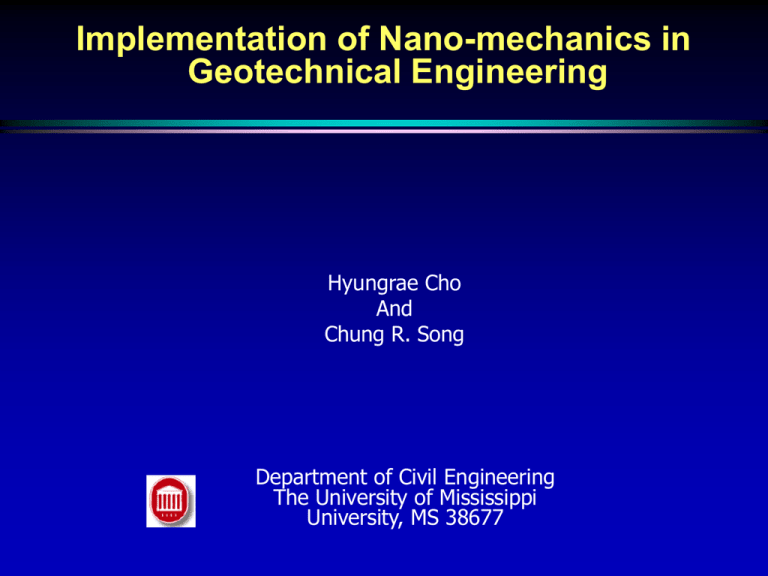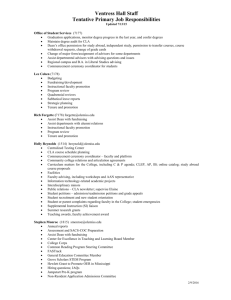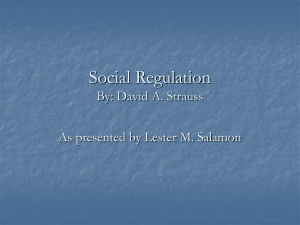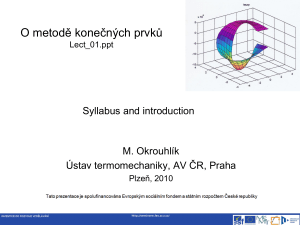Presentation
advertisement

Implementation of Nano-mechanics in Geotechnical Engineering Hyungrae Cho And Chung R. Song Department of Civil Engineering The University of Mississippi University, MS 38677 Contents Introduction Background Nano-mechanics Tentative Results Conclusions Olemiss Civil Engineering Introduction The macro-scale material behavior is a representation of the average micro-scale material behavior. The micro-scale material behavior is a representation of the average molecular-scale (Nano- scale) material behavior. By obtaining molecular-scale material properties, the macro-scale material behavior is obtained, with limited input parameters and with great accuracy and details. With the blooming Nano-technology, molecular-scale material properties have more importance than ever. Olemiss Civil Engineering Theoretical Background (Traditional MM, MD, NM) ETotal ECoul EVDW E Bond Stretch E Angle Bend ETorsion ECoul EVDW e2 4o i j qi q j rij 6 Ro 12 Ro Do 2 i j rij rij E Bond Stretch k1 (r ro ) Well developed. Olemiss Civil Engineering 2 Theoretical Background (Traditional Continuum Mechanics) K n t n n U n W n n t Where, nK is the stiffness matrix, n is the coupling matrix, n is the flow matrix, U is the incremental nodal displacement, W is the incremental pore water pressure, t is the incremental time, n is the equilibrium force, and n is the flow vector Well developed. Most things are smeared into the equilibrium equation. -Elasticity, Plasticity, grain rotation, grain interaction, damage, ….. Olemiss Civil Engineering Theoretical Background (Advantages/Disadvantages) Items Advantages Disadvantages Nano- Capture mech detailed anics Information Need minimal input data Paramount amount of computation. Unfamiliar theory to common engineers Continuum mech anics Difficult to capture detailed information Capture averaged real scale behavior. Familiar theory Need to bridge NanoMechanics and Continuum Mechanics Olemiss Civil Engineering Theoretical Background Bridging Nano- and Continuum(Equivalent frame element method) E Bond Stretch k1 (r ro ) 2 E axial stretch 1 EA (L) 2 2 L Ku f Li and Chou (2003) Odegard et al. (2001) Ostoja-Starzewski, (2002) Ansys Olemiss Civil Engineering Molecular potential energy =Strain energy Theoretical Background Bridging Nano- and Continuum(RVE method) 1 A AdV Vv A: Properties in molecular level A’: Properties in continuum level Voyiadjis et al. (2004) Olemiss Civil Engineering DPD: Maiti et. al. (2004) Theoretical Background Bridging Nano- and Continuumfor soils •Soil grains are continuum in Nano- to micro scale (sand grains and clay minerals). •But they are discrete media in macro scale (soil masss). •Therefore, bridging b/t Nano-, micro, and macro scales for soils shall be done as follows; Molecular Mechanics (Nanoscale) Particula te Continuum Mechanics Mechanic s Olemiss Civil Engineering (Mesoscal (Macroscale) Tentative Results (Surface charge of clay minerals) Muscovite: Montmorillonite: Kaolinite: -194.165 kcal/mol -65604 kcal/mol -162.832 kcal/mol Olemiss Civil Engineering Tentative Results (Properties of muscovite) Elastic Constants (GPa) _______________________ 397.3 341 453.2 -1.847e-010 341 503.4 459.4 3.126e-010 -102.7 -8.669e-010 453.2 459.4 672 5.684e-011 -40.49 -2.558e-010 -9.419e-012 -1.377e-011 -1.421e-011 15.76 -102.7 Olemiss Civil Engineering 238.3 5.689e-012 -40.46 -2.078e-010 -7.529e-012 8.329e-012 -1.61e-011 15.78 8.953e-010 -71.75 123.5 -7.194e-010 -71.75 7.336e-012 229.5 Tentative Results (Properties of Quartz-beta) Elastic Constants (GPa) _______________________ 103.8 11.6 12.28 0.02317 -0.01545 -2.309 11.48 103.9 12.25 0.1154 -0.05009 2.353 12.13 12.23 95.51 0.2123 -0.07562 0.1028 0.01682 -0.03887 -0.02016 46.08 -2.373 0.01008 -0.08894 -0.0679 -0.04894 -2.455 40.21 0.09949 -2.259 2.331 0.004098 0.1255 40.33 Olemiss Civil Engineering 0.02657 Tentative Results (Bridging nano- and micro using DEM) Continuum? Molecular Mechanics: E=104 GPa Particulate Mechanics Continuum Mechanics μ=0.1061 DEM: φ = 26.5o FEM: for e=0.763 Olemiss Civil Engineering What can we do? Conclusions/Remarks With the aid of accessible software to Nano-mechanics, material scientists can predict the detailed material properties that was never possible in the past. Application of Nano-mechanics to obtain the property of macro-scale requires substantial computational efforts, but it is impossible. For soils bridging nano-, micro- and macro scales is achieved by combination of molecular mechanics, particular mechanics and continuum mechanics. Olemiss Civil Engineering Thank you for your attention. Questions? Olemiss Civil Engineering








